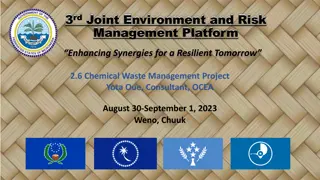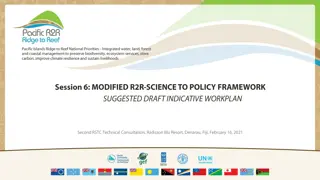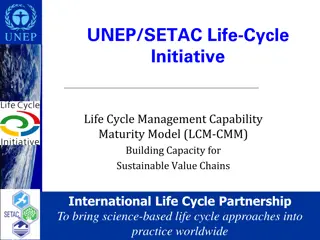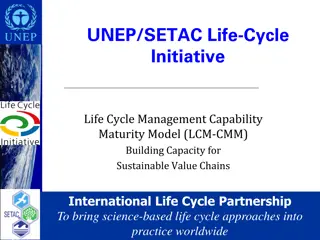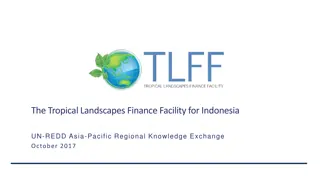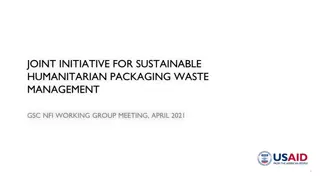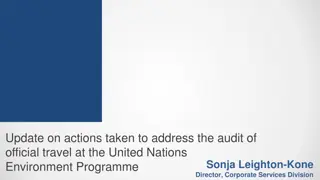Understanding the 2021 Food Waste Index Report
The UNEP Food Waste Index Report, part of the Sustainable Food Systems Programme, emphasizes the importance of reducing food waste for various benefits like food security, climate change mitigation, and resource conservation. The report highlights the need for better data collection and measurement
1 views • 16 slides
Enhancing Synergies for Resilient Tomorrow: Chemical Waste Management Project Overview
Enhancing Synergies for a Resilient Tomorrow outlines a project aimed at strengthening the Federated States of Micronesia's capacity in chemical management. The project focuses on monitoring and evaluating chemical use, enhancing legislative frameworks, and establishing a central database for chemic
1 views • 12 slides
GEF Ridge to Reef Programme for Sustainable Development in Pacific Islands
The GEF Ridge to Reef Programme, a collaborative effort by UNDP, FAO, and UNEP, aims to support the strategic investment for sustainable development in Pacific Islands through integrated environmental and natural resource management. Challenges such as the COVID-19 outbreak and limited local experti
0 views • 6 slides
UNEP Support for Improving UNCCD Reporting Procedures
UNEP has been providing support since 2010 to enhance the reporting processes of the UNCCD, focusing on streamlined funding approaches, technical assistance, and capacity building. Key outcomes include the development of reporting tools, online reporting systems, and building credible data from coun
0 views • 14 slides
Safeguards Information System Development in Zambia: Successes and Challenges
Zambia successfully implemented a Safeguards Information System (SIS) with the support of various partners and stakeholders. The process involved consultation, narrative reporting, and the creation of a web-based platform managed by the Forestry Department. While facing minimal challenges, ongoing i
0 views • 7 slides
Sustainable Value Chains and Life Cycle Management Capability
The UNEP/SETAC Life-Cycle Initiative focuses on building capacity for sustainable value chains through the Life Cycle Management Capability Maturity Model (LCM-CMM). It emphasizes implementing science-based life cycle approaches globally by transitioning from events to management systems, conducting
1 views • 12 slides
Sustainable Value Chains and Business Context in Life Cycle Management
The UNEP/SETAC Life-Cycle Initiative focuses on building capacity for sustainable value chains worldwide through the Life Cycle Management Capability Maturity Model. Understanding the competitive, environmental, and business contexts is crucial for implementing science-based life cycle approaches ef
0 views • 15 slides
Challenges and Opportunities in Addressing High-GWP HFCs in Mobile Air Conditioning: Insights from UNEP Workshop
The UNEP workshop in Bangkok discussed technical issues related to high-GWP HFC management in mobile air conditioning. Experts highlighted the pressure for GWP reduction in Europe, the historical competition between CO2 and R134a, and advancements in technology over the past decade in refrigerant sy
0 views • 9 slides
Tropical Landscapes Finance Facility - Leveraging Private Finance for Public Good
The Tropical Landscapes Finance Facility (TLFF) aims to address Indonesia's funding gap by mobilizing international capital markets to support projects benefiting smallholder farmers, rural electrification, and emissions reduction. TLFF offers long-tenor loans through green bonds and manages a grant
0 views • 13 slides
Joint Initiative for Sustainable Humanitarian Packaging Waste Management Meeting Summary
Collaborative effort of 16 partners in the Joint Initiative for Sustainable Humanitarian Packaging Waste Management, highlighting key steps taken from 2019 to April 2021. The initiative aims to achieve sustainable changes, coordinate efforts, reduce packaging waste, and engage in technical stakehold
0 views • 12 slides
Addressing Audit Findings on Official Travel at UNEP
The audit conducted by the Office of Internal Oversight Services highlighted the critical need for UNEP to enhance accountability and transparency in managing travel funds. Key recommendations include setting the tone at the top, enforcing accountability mechanisms, and developing policies to minimi
0 views • 15 slides

